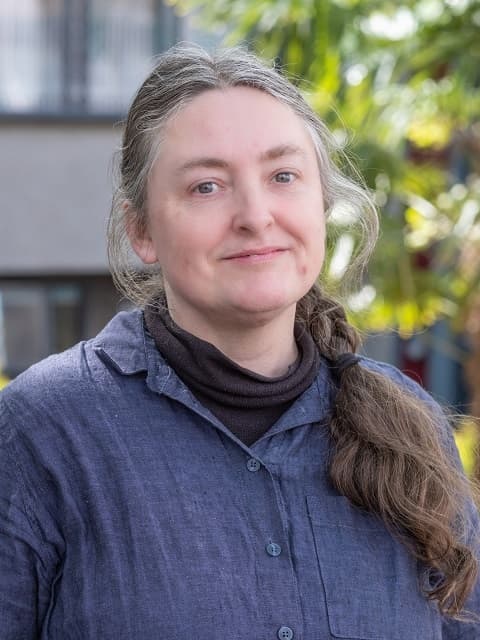Background:
Anna obtained her BSc degree, majoring in Chemistry and Biochemistry, from the University of Adelaide, Australia. After completing an honours degree in Organic Chemistry at the same institution, she went on to complete her PhD at the Australian National University looking at the processes governing formation of free radicals in proteins.
She subsequently completed a European Union-funded postdoctoral fellowship at the University of Newcastle upon Tyne, examining the chemistry of coenzyme B12-dependent enzymes, and was then offered a full academic post at the University of Wales Bangor, where she established her own research group. She was promoted to Senior Lecturer there in 2011 and held visiting positions at the Australian National University (2002), Queen's University, Belfast (2007), University of New South Wales (2008), and Massachusetts Institute of Technology (2010).
In 2013 she joined the Bioprocessing and Biorenewables group at the University of Nottingham, where her team focussed on understanding how biological processes can be used as templates to improve chemical reactivity/intermolecular structuring and, similarly, how an understanding of chemical reactivity can be used to direct biomolecule reactions and structuring for specific outputs (such as production of high-value chemicals and feedstocks from biorenewables, and 3-D printing applications). She won the Dean’s prize in 2014.
In 2023 she took the position of full Professor at Loughborough University, where she will continue with her leading research on ionic liquids, radical enzymes, sustainable 3D printing, biotech, and more.
Outline of main research interests:
To change the world and reach Net Zero we need to creatively disrupt existing modes of chemicals production. We need to think different; new types of solvent, different types of reactivity, utilising the power of biology, widening accessibility, and screening options rapidly with predictive models enhanced by machine learning.
Learn more about our Disruptive Chemistries.
Research grants and contracts:
- AstraZeneca CASE award (2023-2027, PI)
- Proteins in Alien Environments, Leverhulme Research Fellowship (RF-2022-625\4, 2022-2023, PI)
- Dialling up performance for on demand manufacturing, EPSRC (EP/W017032/1, 2022-2027, CoI)
- Accelerated Discovery and Development of New Medicines. Prosperity Partnership for a Healthier Nation, EPSRC (EP/S035990/1, 2019-2023, CoI)
- 2013- IBM/Krembil’s World Community Grid “Modelling of Mycolic Acids from M. Tuberculosis” (https://www.worldcommunitygrid.org/research/hst1/overview.s)
Recent publications:
- “Application of a Synthetic Ferredoxin-Inspired [4Fe4S]-Peptide Maquette as the Redox Partner for a [FeFe]-Hydrogenase”, A. Bombana, M. Shanmugam, D. Collison, A. J. Kibler, G. N. Newton, C. M. Jager, A. K. Croft, S. K. Morra, N. Mitchell, ASAP, 2023, doi:10.1002/cbic.202300250
- “If it’s hard, it’s worth doing: Engineering radical enzymes from anaerobes”, C. M. Jäger, A. K. Croft*, Biochemistry, 62, 2, 241–252, 2023, doi:10.1021/acs.biochem.2c00376, invited.
- “The Activation of Glycyl Radical Enzymes – Multiscale Modelling Insights into Catalysis and Radical Control in Pyruvate Formate-Lyase Activating Enzyme”, M. Hanževački, A. K. Croft*, C. M. Jäger*, J. Chem. Inf. Model., 62, 14, 3401–3414, 2022, doi:10.1021/acs.jcim.2c00362
- “Recent Advances in Use of Ionic liquids as Solvents for Protein-based Materials and Chemistry”, M. L. Hagen, J. B. Harper*, A. K. Croft*, Curr. Opinion. Green Sus. Chem., 36, 100637, 2022, doi: 10.1016/j.cogsc.2022.100637, invited.
- “Perspective — Redox Ionic Liquid Electrolytes for Supercapattery”, L. Guan, G. Z. Chen, A. K. Croft, D. M. Grant, J. Electrochem. Soc., 169 (3), 030529, 2022, doi: 10.1149/1945-7111/ac5ba8
- “Effect of Oriented Electric Fields on Biologically Relevant Iron–Sulfur Clusters: Tuning Redox Reactivity for Catalysis”, S. J. H. Gaughan, J. D. Hirst*, A. K. Croft*, C. M. Jäger*, J. Chem. Inf. Model. 62, 591−601, 2022, doi: 10.1021/acs.jcim.1c00791 – Engineering student prize for best paper 2022
Selected publications:
- “If it’s hard, it’s worth doing: Engineering radical enzymes from anaerobes”, C. M. Jäger, A. K. Croft*, Biochemistry, 62, 2, 241–252, 2023, doi:10.1021/acs.biochem.2c00376
- “Controlling the outcome of SN2 reactions in ionic liquids: From rational data set design to predictive linear regression models”, A. Schindl, R. R. Hawker, K. S. Schaffarczyk McHale, K. T.-C. Lui, D. C. Morris, A. Y. Hsieh, A. Gilbert, A. W. Prescott, R. S. Haines, A. K. Croft*, J. B. Harper* and C. M. Jäger*, PCCP, 2020, doi: 10.1039/D0CP04224B
- “Proteins in Ionic Liquids: Reactions, Applications, and Futures”, A. Schindl, M. L. Hagen, S. Muzammal, H. A. D. Gunasekera, A. K. Croft*, Front. Chem., 7, 347, 2019, doi: 10.3389/fchem.2019.00347
